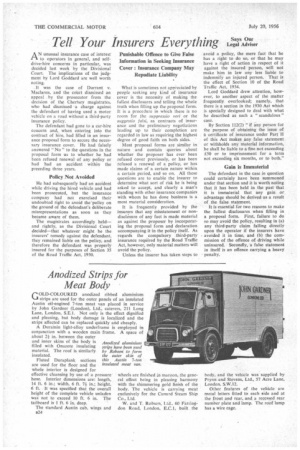Tell Your Insurers Everything L Legal s A 4 iri r se r Punishable Offence to
Page 58

If you've noticed an error in this article please click here to report it so we can fix it.
Give False Information in Seeking Insurance Cover : Insurance Company May Repudiate Liability AN unusual insurance case of interest to operators in general, and selfdrive-hire concerns in particular, was decided last week by the Divisional Court. The implications of the judgment by Lord Goddard are well worth noting.
. It was the case of Durrant v. Maelaren, and the eohrt dismissed an appeal . by the prosecutor from the decision of the Chertsey magistrates, who had dismissed 'a charge against the defendant of having used a motor vehicle on a road without a third-party insurance policy.
The defendant had gone to a car-hire concern and, when entering into the contract of hire, had filled in an insurance proposal form to secure the necessary insurance cover. He had falsely answered "No" to the questions in the proposal form as to whether he had been refused renewal of any policy or had had an accident within the preceding three years.
Policy Not Avoided
He had subsequently had an accident while driving the hired vehicle and had been prosecuted, hut the insurance company had not exercised their undoubted right to avoid the'policy on the ground of the defendant's deliberate misrepresentations as soon as they became aware of them.
The magistrates accordingly held— and rightly, as the Divisional Court decided—that whatever might be the insurers' remedy against the defendant, they remained liable on the policy, and therefore the defendant was properly insured for the purposes of Section 35 of the Road Traffic Act, 1930. What is sometimes not apnreciated by people seeking any kind of insurance cover is the necessity of making the fullest disclosures and telling the whole truth when filling up the proposal form. It is a procedure in which there is no room for the suppressio veil or the suggestio Phi, as contracts of insurance and the preliminary negotiations leading up to their completion are regarded in law as requiring the highest degree of good faith on both sides.
Most proposal forms are similar in nature and contain queries about whether the proposer has ever been refused cover previously, or has been refused a renewal of a policy, or has made claims of a certain nature within a certain period, and so on. All these questions are to enable the insurer to determine what sort of risk he is being asked to accept, and clearly a man's standing with other insurance companies with whom he has done business is a most material consideration.
It is frequently provided by the insurers that any misstatement or nondisclOsure of any fact is made material as against the proposer by incorporating the proposal form and declaration accompanying it in the policy itself. As regards the compulsory third-party insurance required by the Road Traffic Act, however, only material matters will avoid the policy.
Unless the insurer has taken steps to avoid a policy, the mere fact that he has a right to do so, or that he may have a right of action in respect of it against the insured person, will not make him in law any less liable to indemnify an injured person. That is the effect of Section 10 of the Road Traffic Act, 1934.
Lord Goddard drew attention, however, to another aspect of the matter frequently overlooked; namely, that there is a section in the 1930 Act which is specially designed to deal with what he described as such a "scandalous" case.
By Section 112(2) "if any person for the purpose of obtaining the issue of ft certificate of insurance under Part II of this Act makes any false statement or withholds any material information, he shall be liable to a fine not exceeding £50 or to imprisonment for a term not exceeding six months, or to both."
Gain is Immaterial
The defendant in the case in question could certainly have been summoned under that section and it is worth noting that it has been held in the past that it is immaterial that any gain or advantage should be derived as a result of the false statement.
It is essential for two reasons to make the fullest disclosures when filling in a proposal form. First, failure to do so may avoid the policy, resulting in (a) any third-party claim falling directly upon the operator if the insurers have avoided it in time, and (b) the commission of the offence of driving while uninsured. Secondly, a false statement in itself is an offence carrying a heavy • penalty.




































































































